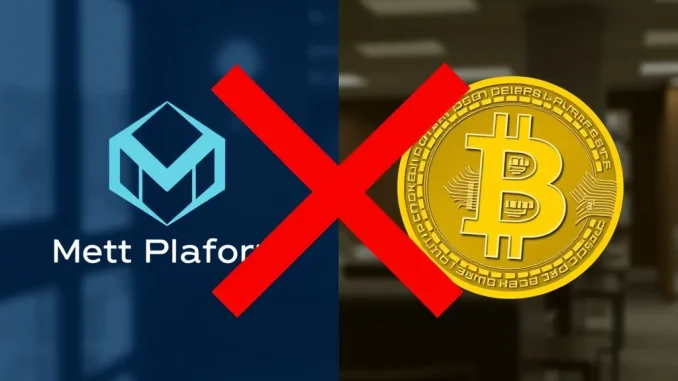
The world of corporate finance often intersects with the evolving digital asset landscape. Recently, a significant event unfolded involving tech giant Meta Platforms and the leading cryptocurrency, Bitcoin. News emerged that a Meta Bitcoin proposal to integrate the digital asset into the company’s substantial cash reserves was decisively rejected by shareholders.
Why Did Meta Shareholders Reject Bitcoin?
The proposal, aimed at diversifying Meta’s treasury and providing a potential hedge, faced strong opposition during the company’s recent shareholders meeting. According to reports, the vote saw a stark contrast: approximately 3.92 million shares were cast in favor of the proposal, while a staggering 4.98 billion shares were cast in opposition.
The primary reasons cited by shareholders for the rejection centered on concerns regarding the inherent volatility of Bitcoin and the potential regulatory uncertainties surrounding digital assets. While proponents argued for Bitcoin’s potential as a store of value and a hedge against inflation or currency devaluation, the majority of shareholders prioritized stability and regulatory compliance for the company’s substantial $72 billion cash pile.
Understanding the Bitcoin Corporate Treasury Trend
The idea of a major corporation adding Bitcoin to its balance sheet isn’t new. Several companies have famously adopted this strategy:
- MicroStrategy: A business intelligence firm that has become one of the largest corporate holders of Bitcoin, actively accumulating BTC over time.
- Tesla: The electric vehicle company briefly held a significant amount of Bitcoin and continues to hold a portion, though its position has fluctuated.
- Block (formerly Square): Jack Dorsey’s payments company has also invested in Bitcoin as part of its corporate strategy.
These examples highlight a growing, albeit still niche, trend among companies looking for alternatives to traditional treasury management, especially in an environment of low bond yields and inflationary concerns. The proposal put before Meta’s shareholders aimed to leverage Bitcoin’s characteristics as a “counterweight against lower bond effectiveness” by converting a portion of surplus cash into BTC.
The Arguments: Meta Cash Reserve BTC vs. Traditional Assets
Let’s look at the core arguments typically made for and against adding Bitcoin to a corporate treasury, which likely mirrored the debate among Meta’s shareholders:
Arguments FOR adding Bitcoin:
- Inflation Hedge: Bitcoin’s fixed supply is seen by many as protection against the devaluation of fiat currencies.
- Potential Appreciation: While volatile, Bitcoin has shown significant long-term growth potential.
- Diversification: Adds an uncorrelated asset to the treasury portfolio, potentially reducing overall risk (though volatility adds its own risk).
- Innovation Alignment: For a tech company like Meta Platforms, holding Bitcoin could be seen as aligning with future digital finance trends.
Arguments AGAINST adding Bitcoin:
- Volatility: Bitcoin’s price can experience rapid and significant swings, posing a risk to capital preservation, which is a primary goal of a cash reserve.
- Regulatory Uncertainty: The legal and regulatory status of Bitcoin varies globally and is subject to change, creating potential compliance and operational risks for a large, public company.
- Security Risks: Holding and managing digital assets requires specialized security protocols to prevent loss or theft.
- Accounting Complexity: Accounting for Bitcoin holdings can be complex under current rules.
- Shareholder Sentiment: Many traditional investors remain skeptical of cryptocurrencies.
The overwhelming vote against the proposal at Meta indicates that for a company of its size and market position, the arguments against, particularly concerning stability and regulatory risks, were far more compelling to the majority of its shareholders than the potential benefits of holding Meta cash reserve BTC.
What This Means for Meta Platforms Bitcoin Strategy
The rejection of this specific proposal doesn’t necessarily mean Meta will *never* engage with blockchain or digital assets. The company is actively involved in areas like the metaverse, NFTs, and digital identity, which could interface with cryptocurrencies in different ways. However, it clearly signals that, for now, adding Bitcoin directly to the corporate balance sheet is not a path the company or its major shareholders are willing to take.
This decision by Meta Platforms Bitcoin treasury approach contrasts sharply with the more aggressive stance taken by companies like MicroStrategy. It underscores that the decision to hold Bitcoin at the corporate level is highly dependent on the company’s specific risk tolerance, business model, and shareholder base.
Key Takeaways from the Meta Shareholders Reject Bitcoin Vote
- The proposal aimed to convert a portion of Meta’s cash into Bitcoin for treasury management.
- Shareholders overwhelmingly rejected the idea, citing stability and regulatory risks as primary concerns.
- The vote count (3.92M favor vs. 4.98B opposition) highlights the significant shareholder skepticism.
- Meta’s decision contrasts with other public companies that have adopted Bitcoin treasury strategies.
- The focus remains on traditional, stable assets for Meta’s core cash reserves.
Conclusion
The rejection of the Meta Bitcoin proposal by its shareholders is a clear indicator of the prevailing sentiment within a major tech corporation regarding direct exposure to volatile cryptocurrencies within its primary cash reserves. While the broader corporate adoption of Bitcoin continues in certain sectors, Meta’s decision underscores the significant hurdles, particularly around perceived risk and regulatory clarity, that Bitcoin still faces in becoming a mainstream treasury asset for all types of companies. For now, Meta’s $72 billion cash pile will remain in more traditional, stable instruments.



